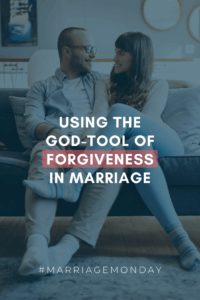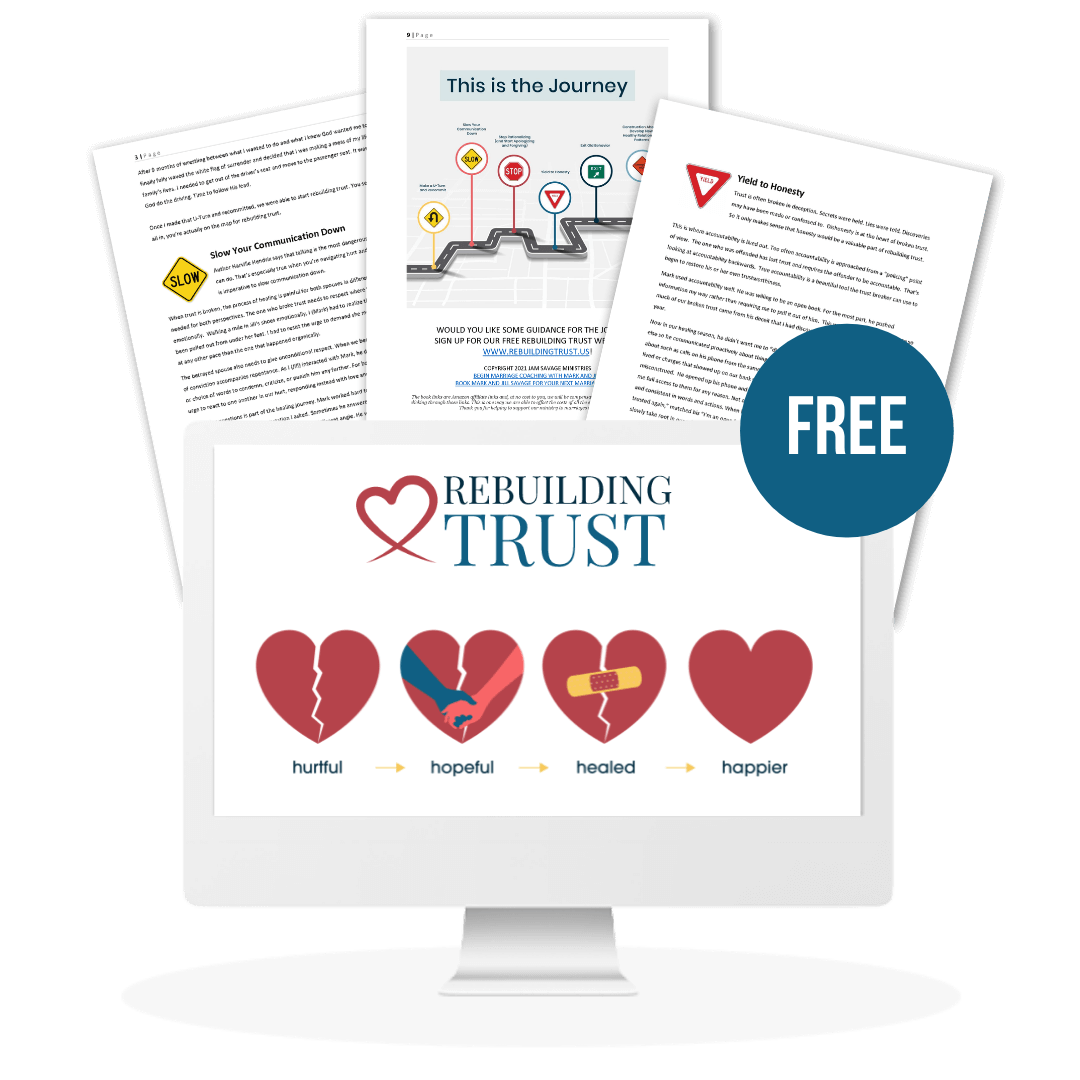 Forgiveness is so important, but it isn’t something that usually comes naturally. This is why it’s one of the God-tools we cover in No More Perfect Marriages. In today’s #MarriageMonday, we’re exploring what it looks like to use the God-tool of forgiveness in marriage.
Forgiveness is so important, but it isn’t something that usually comes naturally. This is why it’s one of the God-tools we cover in No More Perfect Marriages. In today’s #MarriageMonday, we’re exploring what it looks like to use the God-tool of forgiveness in marriage.
Jill: What is a God-tool? The concept actually comes from 2 Corinthians 10:3-6. In The Message version, that passage reads, “We use our powerful God-tools for smashing warped philosophies, tearing down barriers erected against the truth of God, fitting every loose thought, and emotion, and impulse into the structure of a life shaped by Christ. Our tools are ready at hand for clearing the ground of every obstruction and building lives of obedience into maturity.”
Mark: I love that that part that says, “We use our powerful God-tools for smashing warped philosophies and tearing down barriers erected against the truth of God.” That’s what we use our God-tools for in marriage. Oftentimes, what happens is we interact with each other by default, the way we have been for years, and years, and years. Instead, we have to start recognizing when there is a split in the road that allows us to start creating new patterns. We can go through the same patterns we always have, or we can pause and say, “Wait a minute, I have some other options. I have some tools I can use.”
Jill: Let me tell you, learning to use the God-tool of forgiveness can be uncomfortable! At first, it can almost feel foolish or hopeless. But we have to look at the opportunity, seize it, and push through uncomfortable to create that new normal both in our heart and in our relationship.
Mark: Exactly. Forgiveness is probably one of the most underused God-tools we have in our marriage toolbox. I think we usually think of forgiveness for the “really big” things. In those moments, we have to find it within ourselves to forgive, but that’s really not what forgiveness is all about. It is about handling the condition of our heart on a daily, hour-by-hour, minute-by-minute basis.
What does unforgiveness look like?
Jill: So let’s start with this: If we don’t use our God-tool of forgiveness, what will we experience? The first thing that we would find, if we don’t use our God-tool of forgiveness, is bitterness. We start to grow bitter against our spouse for what they’re not doing, or what we think that they should be doing, and it begins to poison our heart.
Mark: Jill and I have really enjoyed gardening through the years, and I think of bitterness as one of the wild weeds. In our area, we have a couple common weeds. One of them is Morning Glory, and it looks like a really beautiful flower. One day, you can see a flower grow; the next day, it’s taken over everything. Those weeds will work to wrap themselves around the actual plant, and eventually, draw it down and kill it. That’s what unforgiveness is like. Unforgiveness is the seed of bitterness. Bitterness will consume every aspect of your thought, your behavior, your actions, and your beliefs. It’ll consume your heart.
Jill: The second thing we can experience if we don’t use our God-tool of forgiveness is physical and emotional exhaustion. Seriously! It robs us of physical energy when all we’re doing is rehearsing arguments in our head. We literally are expending physical energy through stress. A lot of anxiety is stress-induced and so much of stress is induced by unforgiveness: our heart being tangled up, our soul being sucked dry, because we have so much unforgiveness inside of us.
Mark: It’s not only those arguments that we rehearse that exhaust us, but also the lies we rehearse in our minds. I‘ve personally had to battle against that. Sometimes, it leaves me exhausted. At times, it’s not even about having to forgive Jill, or another person, but really about offering forgiveness to myself because I’ve been allowing lies to settle in my heart.
Jill: The third result of unforgiveness is a hard heart. When we have a hard heart, we put up a wall around our heart, and our spouse can’t get in. We’re not interested in resolving conflict. We shut ourselves off emotionally, even physically sometimes. And so that hard heart does nothing but separate us.
Mark: This is a slow fade in action! A slow fade is when we have these things that slowly separate our hearts, just 1 inch at a time. We don’t notice at first, but when the inches become feet and the feet become yards, we start to realize there are miles between us. When we use our God-tools, it closes those fades. When we use the God-tool of forgiveness, it softens our heart, and it begins to close the distance, no matter how large or small, that our unforgiveness had put between us and our spouse.
Jill: When we don’t use our God-tool of forgiveness, we often are self-protecting. That’s part of that hard heart as well. We build that wall up, and we protect rather than connect, which puts distance between us and our spouse.
Mark: For myself, I have self-protected by not being engaged, by not being present, by appearing to be busy, while in reality, I’m just not wanting to be intimate. I’m not just talking about sex; I’m talking about being present and attentive to my spouse. In the past, that often would flow out of unforgiveness.
Jill: We could even say that lack of intimacy is another risk of unforgiveness. A lack of forgiveness makes it so we’re unable to be emotionally or physically intimate with our spouse.
Mark: I’d say the final result of unforgiveness is a lack of closure in conflict. We’ve experienced it in our marriage, but we often hear couples say, “There’s never closure. We argue, we argue, we argue, until we just both walk away, and then we never have any closure.” Well, usually, that’s because we don’t ask for forgiveness. We don’t own our own part. We don’t offer forgiveness. Forgiveness is really what brings that closure.
What does forgiveness look like?
Jill: So what does it look like to use our God-tool of forgiveness? Well, the biggest result is that we are actually able to manage the imperfection in our relationship. A real marriage isn’t made up of two perfect people, but instead is made up of two people being perfected. That means we’re going to bump into each other’s imperfect from time to time, and that’s when forgiveness has to come into play.
Mark: I think of Colossians 3:12, which says, “Put on then, as God’s chosen one, holy and beloved, compassionate hearts, kindness, humility, meekness, and patience, bearing with one another. And if one has a complaint against another, forgiving each other, as the Lord has forgiven you, so you must also forgive.” Forgiveness isn’t just a good idea; it’s a freeing experience.
Jill: When we choose to use our God-tool of forgiveness, we actually experience improved health and an untangled emotional soul. What a difference that makes for us! When we have a hard heart, we feel anger and hurt, and we are unavailable to God. When we use our God-tool of forgiveness, we experience peace. The Bible describes this as “peace that surpasses understanding” (Philippians 4:6).
Mark: When we offer forgiveness, we begin to experience what it’s like to trust God to protect instead of trying to do it ourselves. We start to experience vulnerability in our relationship, and we are able to be real in our relationships. Regardless of whether our spouse is reciprocating or not, we’re experiencing a new level of vulnerability and intimacy because of the way that we are intentionally responding. Additionally, we experience the closure that we long for in conflict.
Jill: Forgiveness requires hard internal work. It may involve having a conversation with someone; it may not. It may just be between you and God as you choose to get your heart untangled so it’s available to Him again. Here’s what forgiveness looks in a practical sense:
Lord, I forgive him for not taking the trash out.
Lord, I forgive her for being too tired to snuggle.
Father, I forgive him for falling asleep on the couch and not sharing the movie with me.
Father, I choose to forgive her for not understanding my need for connection.
Mark: This week, we encourage you to use your God-tool of forgiveness! Let’s change our patterns of relating with our spouse so we can experience deeper connection, deeper intimacy, and even more joy in marriage.












